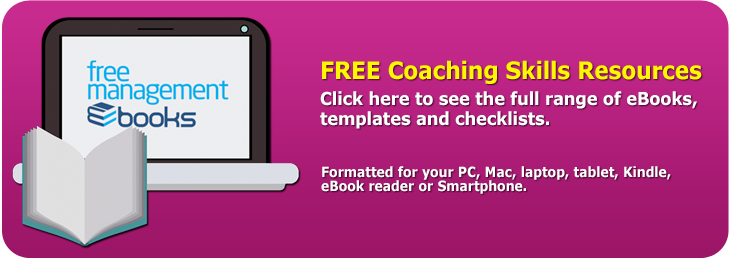Internal and External Coaches - Advantages and Disadvantages
Suppose you have identified that a member of your team who would benefit from being coached to improve their knowledge, skills, and performance for an activity due to be completed in the next quarter. You need to ask yourself, Is this something you as their manager have the time and skill to do? Or is this a situation where the use of a professional coach will be the most effective way to get results?
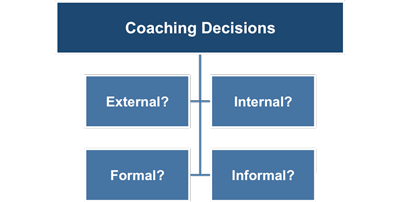 |
Once you know who is performing the role of coach you then need to decide whether or not the coaching should be conducted in a formal or informal manner. Coaching can be done using professional coaching services supplied by an independent firm or consultancy, or it can be done by the manager themselves or by someone else within the organization.
As part of your decision-making process you will have to consider the advantages and disadvantages of each of these approaches.
External Coaches
External coaches have typically received a more extensive coaching training than managers, and have spent more time coaching people. In addition to their core coaching skills, external coaches with specialist expertise can be matched to the coachee's requirements. For example, a coach specializing in sales skills could be brought in to support a sales team.
Team members may feel able to discuss issues with an external coach that they would not discuss with their line manager, and these hidden issues may be critical to improving performance. Because they are not affected by the organization's internal politics, external coaches are more adept at providing sensitive feedback, as well as maintaining objectivity and confidentiality.
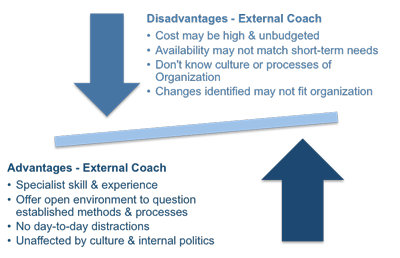 |
People are more likely to cooperate and discuss issues freely with external coaches as they are not directly involved in the day-to-day business of the organization. An external coach is not burdened with preconceptions about either the coachee or the organization. This means that they can often see things that are not obvious to the coachee's manager or to people embedded in the organization's culture and processes.
Also, because the external coach does not have the additional responsibilities of a manager, they can focus exclusively on the coachee's needs before, during, and after the coaching session. This can lead to an intensive, high-energy form of coaching that can produce significant results in a short time.
The disadvantages of external coaching include its cost, since it is always going to be more expensive than using existing resources. Also, it might be felt that the coach's lack of intimate knowledge of the organization's culture and processes could be a problem.
The interaction between the coach and coachee needs to create improved skills and knowledge that can be incorporated into the culture and processes of the organization. For example, for the coachee's ideas to be adopted the organization might have to make significant and costly changes to one of their systems.
This sort of issue can be avoided if the coachee's manager has regular communications with the coach and ensures that ideas that are outside of the scope of the particular development are brought to the attention of the business development team who are able to explore them further.
Internal Coaches
For many reasons, such as pressures of time or budget, you may not have the luxury of using a professional coach. This means that you have to resource the coaching needs of your team member internally.
However, since very few organizations employ professional coaches, if an external coach is not going to be used then the task usually falls to the team member's own manager - that's you! Or if not you then it could involve you having to select a colleague, another manager, or human resource specialist to perform the coaching role.
The main advantage to the organization of using internal coaches is that they do not have the direct costs that hiring an external coach would. Also, as the coachee's direct manager you already spend time with them and the coaching role provides you with the opportunity to get to know them well, whilst you build and demonstrate a foundation of mutual trust and respect.
In addition, because you are constantly interacting with your team you will have many more opportunities to influence them than an external consultant would have. This may not be so applicable if the internal coach is someone outside of the team or department, unless the coach is already in frequent contact because of the nature of the activity itself.
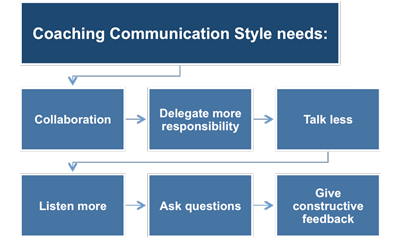 |
It is essential that whoever performs the role of internal coach remembers that the traditional corporate 'command and control' approach is inappropriate in these circumstances. Instead, coaching emphasizes:
• Collaborating instead of controlling
• Delegating more responsibility
• Talking less and listening more
• Giving fewer orders and asking more questions
• Giving specific feedback instead of making judgments
It is important to say that this style of management is not necessarily applicable all of the time and there will be occasions when a manager needs to use a more autocratic leadership style to get things done quickly or to break a deadlock situation.
There is good evidence though that using a predominantly coaching style brings medium- to long-term benefits to the team, and to the organization as a whole. This approach works best in an environment where there is a learning culture that is fully supported by senior management.
It is probably fairly obvious that coaching benefits the people being coached - but what about the manager? If you are a busy manager, can you afford the time and effort required, when you already have plenty of other demands to cope with?
Coaching is not a case of 'giving up' your time and energy to help others achieve their goals and solve their problems. It can also bring you and the organization significant benefits. One of the most significant is the effect coaching can have on the morale of your team. Showing that you value your team enough to spend time coaching them to develop their own skills and potential will gain their respect and confidence.
Individuals are often just waiting for someone to show that they have confidence in them, before they open up with their own ideas and feel that their contribution is valued. The more genuine control people have over their own goals and decisions the more commitment they will display to attaining those goals or following through decisions.
This openness and acceptance of others' ideas and thinking helps to improve the working relationships within your team and organization. The collaborative nature of these relationships makes people feel empowered and creates an atmosphere of trust and honesty. Such attributes will have a direct impact on the performance of the individual as well as the team.
The long-term benefits of investing your own time in developing and coaching your team members can be considerable. Your team will become more self-sufficient, enabling you to delegate tasks with confidence and focus your skills and time on the higher-level tasks that only you can perform.
The environment of empowerment allows individuals to be creative and intuitive when solving problems and issues. It also allows the circulation of more accurate and informative data, because no one feels they will be penalized for making suggestions.
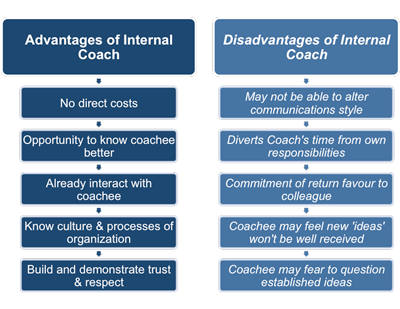 |
But making use of internal coaches does have some disadvantages and it is important to be aware of these. If these issues are present in your own organization they will have an impact on how effective internal coaching will be. In the short term your coaching activity can have a detrimental impact on your time and possibly your productivity. With careful planning these impositions are short lived and are far out-weighed by the long-term benefits.
Any internal coach must have the ability to adapt their communications style to that most suited to this activity. The coach must be able to relinquish control for collaboration and, through careful and well thought-out questioning, to draw out a solution from the coachee.
Another issue that can cause problems for internal coaches is the interference of their own task pressures, which may prevent them from having the time they want (and know they need) in order to conduct coaching properly. These pressures may force the coach to take control back, or mean that they don't have the time to explore the issue or problem facing the coachee and guide the coachee to think of a resolution.
The attitude of the coachee and the culture of the organization also play a significant role in how effective coaching will be. If the culture of the organization is such that employees see that to express ideas and question things is harmful to their prospects they will be guarded in their approach to coaching.
This occurs in organizations where individuals can see that questioning established processes or ideas is poorly received by senior management. Such news always travels widely and quickly along an organization's grapevine and is extremely detrimental to the level of trust and openness required in order for coaching to be successful.
It could be argued that it is impossible for a manager to act as a coach, given their position of authority over his or her team. This is not necessarily an obstacle, provided that there is genuine trust and respect in the working relationship.
Finally, the decision regarding whether to use an internal or external coach will depend on the money available, the needs of the people involved, and the ethos of your organization.
You may also be interested in:
Coaching Management Style | Management Coaching Skills | Differences Between Coaching and Training | Differences Between Coaching and Mentoring | Formal and Informal Coaching | Coaching Skills for Managers | Successful Coaching Skills.


